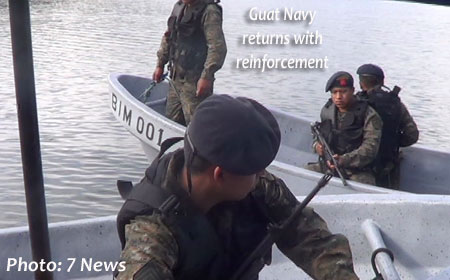BELIZE CITY, Mon. Nov. 2, 2015–In the wake of the Belize Territorial Volunteers’ expedition to Sarstoon Island on Sunday, August 16, 2015, when unarmed Belizean civilians were aggressed by Guatemalan Navy boats, Prime Minister Dean Barrow held a press conference and told the nation that the BDF has been under constant threat from the Guatemalan military.
Indeed, our BDF are routinely challenged by the Guatemalans and frequently told to turn back. Our soldiers never retreat and are never deterred by these standoffs. They always complete their mission, even when under threat.
The Prime Minister, however, did not say exactly when these threats had started, nor did he say how long the Guatemalan military has been asserting control over the Sarstoon River. For an extended period, the Government of Belize has been content to play by the rules of the Organization of American States-brokered, so-called “Confidence Building Measures,” and has refused to take the necessary diplomatic offensive to protect and defend Belize’s sovereignty.
A document that has been leaked to Kremandala from the Belize Defence Force and which has been designated as “confidential” under the caption, “Threat Assessment-Sarstoon River – As of 14 October 2015,” exposes the government’s apparent hesitation to jettison the OAS Confidence-Building Measures framework and explore bold, new diplomatic avenues to preserve Belize’s sovereignty over all of its territories as defined in the Constitution of Belize.
The document, which was addressed to Lt. Col (Ret’d) George Lovell, Chief Executive Officer, Ministry of National Security, and signed on behalf of the Commander by R. Beltran A/Major, opened saying, “The Belize Defence Force conducted a threat assessment on the current situation at the Sarstoon River in order to have a clear view on Guatemala’s Sarstoon River claim.”
The BDF said its assessment “is based on intelligence analysis and encounters with the Guatemalan Army/Navy at the Sarstoon River Mouth.”
“Records show that the aggressive behavior of the Guatemalan Army/Navy started around 2006. The aggression towards the BDF personnel are done whilst the BDF are conducting changeover at Cadenas and have to go through the Sarstoon River,” the document stated.
The report noted, “Whilst some of the encounters were for the most part cordial, there were several tense moments, which were discussed at the Quarterly BDF/GA Meetings.”
The BDF said its record shows that they have encountered the Guatemalan Army in 2003, 2004, 2005; however, 2006 saw the beginning of Guatemalan Army aggression towards members of the BDF transiting the Sarstoon River. Only one incident was recorded in 2006, said the report.
In 2007, there was an increase in the amount of Guatemalan vessels “from one small camouflage Mexican Pesquero skiff to 4 additional vessels which were seen in the area.”
On May 29, 2007, the Guatemalan Army, with the assistance of its Navy, had blocked the south side of the Sarstoon Island from the BDF patrol.
This section of the report described the four Guatemalan vessels, including BITOL GC 655, which had a machine gun which appeared to be 50-caliber type, and SALAMA GC275, which was also fitted with a 50-caliber machine gun.
The BDF said there was no record of aggression on the part of the Guatemalan military in 2008. In 2009, this was due to a “Gentleman’s agreement” negotiated by the BDF Commander Brigadier General Lloyd Gillett and Guatemalan Army General de Brigada Mario Auguliar Bran.”
While the BDF record reveals that the Guatemalan Army aggression began in 2006, the Guatemalans appeared to have gotten bolder when, “In 2009, the Guatemalan Army started again with aggressive behavior towards members of BDF transiting the Sarstoon River.”
So since 2009, “the BDF Boat Squadron encountered a 40-foot Guatemalan vessel anchored at the mouth of the Sarstoon River, which appeared to be inside Belizean territorial waters. Two additional Guatemalan Army vessels were met further up the river patrolling on the Belizean side of the river.”
When the BDF inquired why they were patrolling inside Belizean waters, the Guatemalan Army responded that they were acting upon orders received from their superior commander.
“Post changeover: the patrol observed a Guatemalan flag flying from a tree on Sarstoon Island. This flag was removed on 3 November 2009, and handed over to the Guatemalan Army Officer Lieutenant Ricardo Melendez Gonzalez, who stated that they would place back the flag again as instructed by their superior officer,” the report said.
By the next month, December 2009, Guatemalan Army personnel attempted to stop a BDF patrol from using the southern channel.
The BDF said 2010 saw an increase in encounters; however, the meetings were cordial, except for two incidents that were of concern.
“2011 to the end of 2013, encounters and escorting of the BDF vessel became a routine; however, GA patrols were always cordial and no reports of dialogue were received,” said the report.
In 2014, the report said there were no reports of Guatemalan Army personnel in the Sarstoon River.
“On July 2015, reports of GA vessel escorting BDF vessel were again received from BDF personnel conducting changeover at Cardenas OP, which is believed to have been triggered by the GA’s previous encounter with the Belize Coast Guard on the 31 May, 2015, and the BTV’s activities in the area,” the document further outlined.
Since then two major incidents of concern were reported on August 15 and August 25, the report said.
On August 25, GA personnel stopped the BDF patrol and stated that they had taken down a Belizean flag from Sarstoon Island.
The report said that the Guatemalan Navy has two main bases in the area and they have a total of around 55 vessels between the two bases. The biggest vessel is 105 feet long and some small wooden canoes are stationed at each base. “These are used to patrol in the seas and along coastal areas adjacent to Belizean waters,” the report mentioned.
The report ends adding, “It is recommended that a video camera is issued to all BDF patrols, for videotaping encounters with the GA personnel along the border.”

